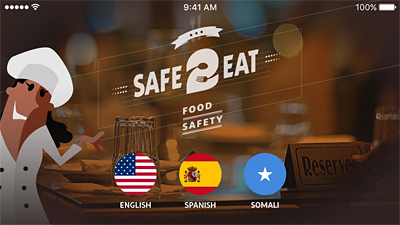
“In Somalia, for example, because of the tropical, hot climate, most people prefer to cook outside. Here they cook inside with all of the windows closed,” says Farhiya Farah, a Somali immigrant, former Minneapolis food inspector, and founder of GlobeGlow, a Minneapolis-based consulting and research firm serving ethnic food businesses. “In the United States, there is heavy use of refrigeration and a lot of left-over food that needs to be stored. It’s a different world here.”
In Minneapolis alone, there are an estimated 63 Somali foodservice establishments, each employing up to seven workers.
Craig Hedberg, a professor in the School of Public Health and one of the nation’s food-borne disease experts, is working to bridge the cultural divide when it comes to food handling and preparation that many new immigrants encounter.
“We want to help people in the Somali and other immigrant groups get a better understanding of food safety and the Minnesota Food Code,” Hedberg says. “One of the issues we face is that a lot of restaurant workers are new limited-English speaking immigrants.”
To address that challenge, Hedberg and Farah developed a smartphone app in English and Somali that uses videos and interactive features to describe food-safety practices and to train people in the Minnesota Food Code. Their work is one of six new projects that received $1.24 million in funding for fiscal year 2016 through Global Food Ventures, part of the Discovery Research and InnoVation Economy (MnDRIVE) partnership between the University and the state of Minnesota.
The app is based on existing training materials developed in English for those interested in becoming certified food managers. To pass the certification test, a person must be familiar with several hundred state regulations.
“We are targeting the people who run the establishments and who are training to be certified food managers,” Hedberg says. “One advantage of the app is that it is portable. People can carry it with them and access it to refresh their knowledge, and they can also use the app to train others. Our goal is to have everyone in the restaurant understand safe food-handling practices.”
One of the app’s videos demonstrates how to prevent cross contamination by storing meat and fish on a lower refrigerator shelf and fruits and vegetables on a higher shelf to prevent meat and fish juices from dripping down and contaminating the produce. After watching the video, users of the app can test their knowledge by interactively placing a variety of food items on the proper shelf of a refrigerator.
“If we can demonstrate improved compliance with the Minnesota Food Code by Somali food establishments using the app, we can then translate the prototype into other languages,” says Farah, whose company helped guide translations in Somali and Spanish, created a mobile web infrastructure, and facilitates ongoing marketing and promotion.
The iPhone compatible app can be downloaded via the App store.
MnDrive is an $18-million annual investment by the state of Minnesota. Global Food Ventures provides awards to scientists in the University of Minnesota’s School of Public Health, College of Veterinary Medicine, and College of Food Agricultural and Natural Resource Sciences. Projects in Global Food Ventures bring research, agriculture, and industry together to develop holistic approaches to ensure a safe and sustainable food system. In addition to Global Food Ventures, MnDRIVE’s research areas are: Advancing Industry, Conserving Our Environment; Discoveries and Treatments for Brain Conditions; and Robotics, Sensors and Advanced Manufacturing.
